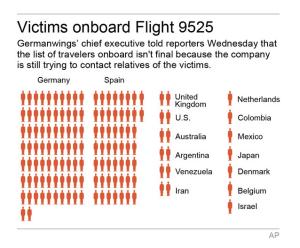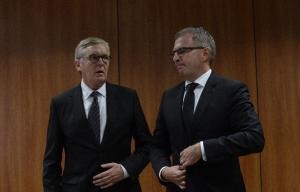PARIS (AP) — The co-pilot of the Germanwings jet barricaded himself in the cockpit and "intentionally" rammed the plane full speed into the French Alps, ignoring the captain's frantic pounding on the cockpit door and the screams of terror from passengers, a prosecutor said Thursday.
In a split second, he killed all 150 people aboard the plane.
Andreas Lubitz's "intention (was) to destroy this plane," Marseille prosecutor Brice Robin said, laying out the horrifying conclusions French investigators reached after listening to the last minutes of Tuesday's Flight 9525 from the plane's black box voice data recorder.
The Airbus A320 was flying from Barcelona to Duesseldorf when it lost radio contact with air traffic controllers and began dropping from its cruising altitude of 38,000 feet. The prosecutor said Lubitz wordlessly set the plane on an 8-minute descent into the craggy French mountainside that pulverized the plane.
He said the German co-pilot's responses, initially courteous in the first part of the trip, became "curt" when the captain began the mid-flight briefing on the planned landing.
Robin said the pilot, who has not been identified, left the cockpit when the plane reached cruising altitude, presumably to go to the lavatory. Then the 28-year-old co-pilot took control of the jet as requested.
"When he was alone, the co-pilot manipulated the buttons of the flight monitoring system to initiate the aircraft's descent," Robin said.
The pilot knocked several times "without response," the prosecutor said, adding that the cockpit door could only be blocked manually from the inside.
The co-pilot said nothing from the moment the captain left, Robin said: "It was absolute silence in the cockpit."
View gallery

A French gendarme helicopter flies over the crash site of Germanwings Airbus A320, near Seyne-les-Al …
The A320 is designed with safeguards to allow emergency entry into the cockpit if a pilot inside is unresponsive. The override code known to the crew does not go into effect, however — and indeed goes into a lockdown — if the person inside the cockpit specifically denies entry.
During the flight's final minutes, pounding could be heard on the cockpit door as the plane's instrument alarms sounded but the co-pilot's breathing was calm and that of a fully conscious man, Robin said.
"You don't get the impression that there was any particular panic, because the breathing is always the same. The breathing is not panting. It's a classic, human breathing," Brice said.
No distress call ever went out from the cockpit, and the control tower's pleas for a response went unanswered.
Air traffic control cleared the area to allow the plane to make an emergency landing if needed, and asked other planes to try to make contact. The French air force scrambled a fighter jet to try to head off the crash.
Just before the plane hit the mountain, passengers' cries of terror could be heard on the voice recorder.
"The victims realized just at the last moment," Robin said. "We can hear them screaming."
Airlines in Europe are not required to have two people in the cockpit at all times, unlike the standard U.S. operating procedure after the 9/11 attacks changed to require a flight attendant to take the spot of a briefly departing pilot.
View gallery

Graphic shows aircraft and victims by country; 2c x 5 inches; 96.3 mm x 127 mm;
Neither Robin nor Lufthansa indicated there was anything the pilot could have done to avoid the crash, saying he had acted appropriately.
Robin said Lubitz had never been flagged as a terrorist and would not give details on his religion or his ethnic background. German authorities were taking charge of the investigation into him.
Lufthansa CEO Carsten Spohr said the airline was already "appalled" by what happened in its low-cost subsidiary.
"I could not have imagined that becoming even worse," Spohr said in Cologne. "We choose our cockpit staff very, very carefully."
Lubitz had joined Germanwings in September 2013, directly out of flight school, and had flown 630 hours. Spohr said the airline had no indication why he would have crashed the plane. He said pilots undergo yearly medical examination but that doesn't include psychological tests.
Lufthansa's chief said Lubitz started his training in 2008 and there was a "several-month" gap in his training six years ago. Spohr said he couldn't say what the reason for that was but after the break "he not only passed all medical tests but also his flight training, all flying tests and checks."
Robin avoided describing the crash as a suicide.
"Usually, when someone commits suicide, he is alone," he said. "When you are responsible for 150 people at the back, I don't necessarily call that a suicide."
View gallery

Germanwings CEO Thomas Winkelmann, left, and Lufthansa Group CEO Carsten Spohrin arrive for a press …
In the German town of Montabaur, acquaintances told The Associated Press that Lubitz appeared normal and happy when they saw him last fall as he renewed his glider pilot's license.
"He was happy he had the job with Germanwings and he was doing well," said a member of the glider club, Peter Ruecker, who watched Lubitz learn to fly. "He gave off a good feeling."
Lubitz had obtained his glider pilot's license as a teenager, and was accepted as a Lufthansa pilot trainee after finishing a tough German college preparatory school, Ruecker said. He described Lubitz as "rather quiet" but friendly.
Lubitz's Facebook page, deleted sometime in the past two days, showed a smiling man in a dark brown jacket posing in front of the Golden Gate Bridge in San Francisco. The Facebook page was restored after the French prosecutor's press conference.
Robin said the Germanwings plane's second black box still had not been found but remains of the victims were being collected and DNA identification had begun.
In the Alpine hamlet of Le Vernet, French authorities set up a viewing tent for family members on Thursday to look toward the site of the crash, which lies on a steep, treacherous site only reachable by a long hike.
Robin said Lubitz's family was in France but was being kept separate from the other victims' families. The victims' families were briefed ahead of the press conference.
"The victims deserve explanations from the prosecutor," Robin said. "(But) they are having a hard time believing it."
The principal of Joseph Koenig High School in Haltern, Germany, Ulrich Wessel, which lost 16 students and two teachers in the crash, said the state governor had called him Thursday afternoon to tell him about the probe's conclusion.
"It is much, much worse than we had thought," Wessel said. "It doesn't make the number of dead any worse, but if it had been a technical defect then measures could have been taken so that it would never happen again."
The circumstances of the crash are likely to revive questions about the possibility of suicidal pilots and the wisdom of sealing off the cockpit.
"From the moment it became apparent that the Germanwings flight had made a controlled descent for 8 minutes with no 'Mayday,' one feared that either pilot suicide or hijack was the cause," said Philip Baum, London-based editor of trade magazine Aviation Security International.
"The kneejerk reaction to the events of 9/11 with the ill-thought reinforced cockpit door has had catastrophic consequences," he added.
___
McHugh reported from Montabaur, Germany. David Rising in Berlin; Kirsten Grieshaber in Cologne, Germany; Alan Clendenning in Madrid; Danica Kirka in London; Sylvie Corbet, Philippe Sotto and Angela Charlton in Paris; and Greg Keller in Vernet, France, contributed to this report.